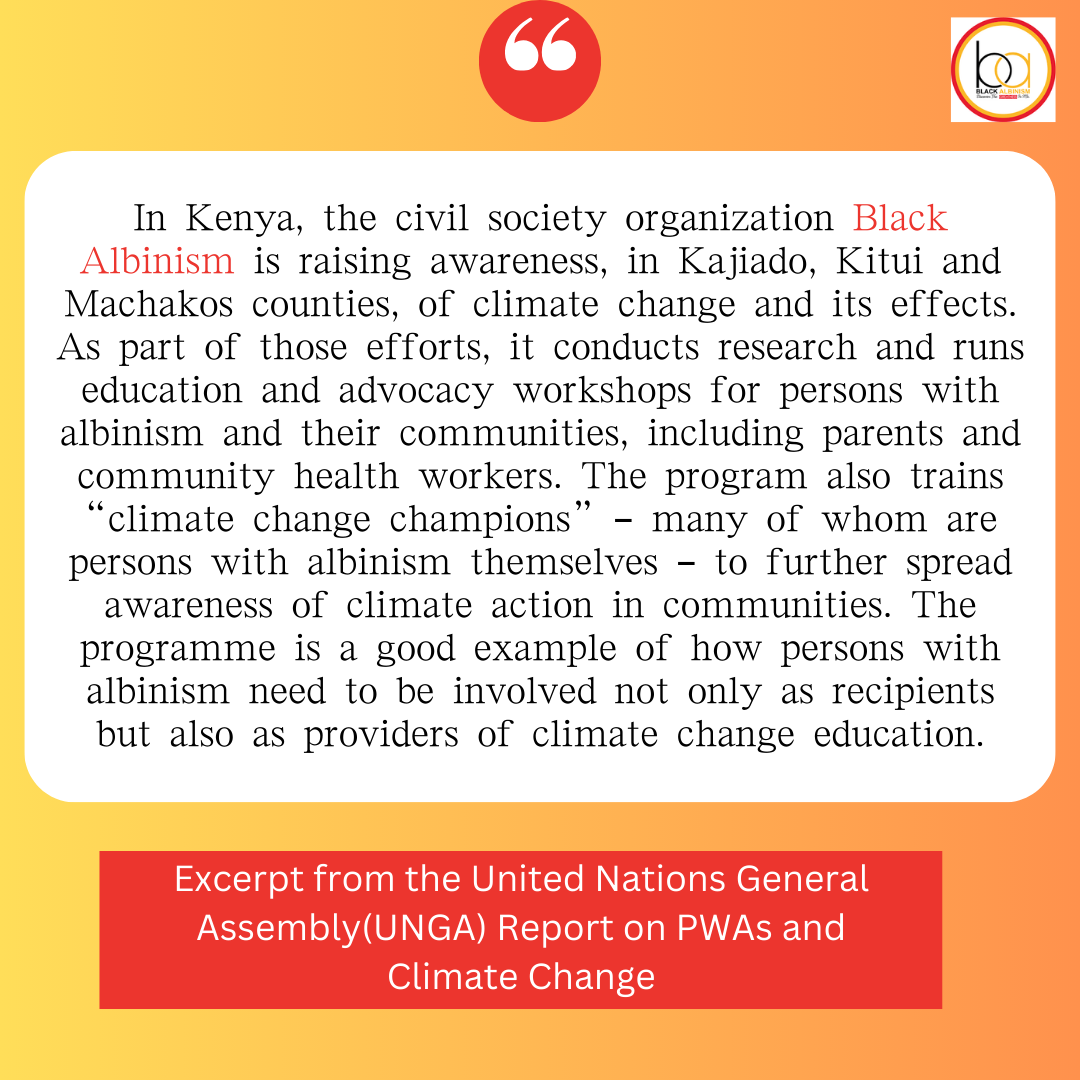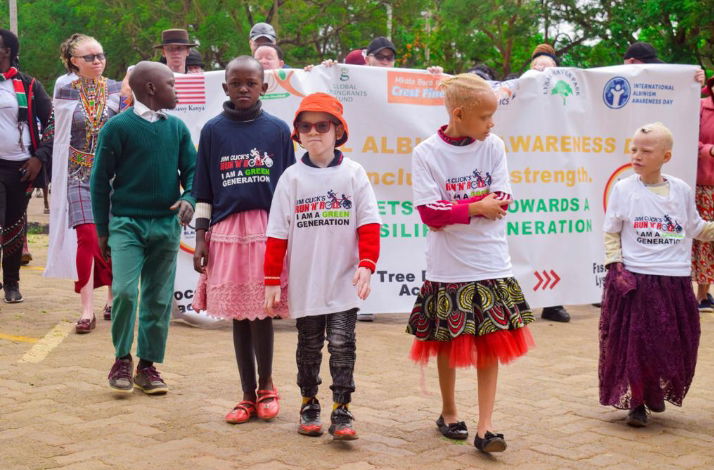THE UNITED NATONS GENERAL ASSEMBY(UNGA) SHINES A SPOTLIGHT ON BLACK ALBINISM’S WORK AROUND ALBINISM ADVOCACY, ALBINISM AWARENESS AND WORK AROUND CLIMATE CHANGE
The United States General Assembly (UNGA) recently shone a spotlight on the crucial and vital work carried out by Black Albinism around advocating for the rights of persons with albinism, and our involvement in addressing the pressing issue of climate change and its effects on persons with albinism. The findings, as presented by a report by the United Nations General Assembly(UNGA), on the Enjoyment of human rights by Persons With Albinism with a highlight on the effects of climate change on persons with albinism, underscore the devastating effects of climate change on persons with albinism, which resonate and marry with the challenges Black Albinism witnessed in counties such as Murang’a, Kisumu, Machakos, Mombasa, and Kitui, where Black Albinism has been actively partaking in climate change advocacy campaigns.

International recognition by the United States General Assembly means a lot for not only us as an organization but moreso the albinism community. This translates to the challenges faced by the albinism community being heard and acted upon on and from an international platform. This is a win for the Albinism community and an encouragement that our voices are being heard and sooner rather than later we will begin to witness change from the international sphere.
The major similar findings of the UNGA report and Black Albinism's report are as follows;
Increased Ultraviolet Radiation and Sun Exposure
One of the most pressing issues for individuals with albinism is their vulnerability to increased ultraviolet (UV) radiation and sun exposure. Their skin lacks the natural melanin protection that most people have, making them exceptionally sensitive to the sun. Without this natural protection, their skin is more prone to long-term damage, including premature aging and a heightened risk of developing various forms of skin cancer. The continual need to safeguard against UV radiation imposes significant lifestyle adjustments, limiting outdoor activities and requiring constant vigilance when outdoors.

A picture with some kids with albinism during a procession walk for climate change advocacy.
Impact on Livelihoods
The escalating levels of UV radiation impose significant disruptions to the daily routines of individuals with albinism, compelling them to make substantial adjustments to avoid direct exposure to the harsh sunlight. As a result, many find themselves constrained to work during unconventional hours, such as early mornings or late nights, to minimize their contact with the scorching sun. This alteration in their working schedule not only compromises their physical well-being but also poses substantial challenges to their livelihoods and economic prospects. The necessity to seek employment during non-traditional hours often limits their access to regular employment opportunities, hindering their ability to secure stable and sustainable sources of income. Consequently, this limitation further exacerbates the existing socio-economic disparities faced by individuals with albinism, emphasizing the urgent need for inclusive policies and support systems that accommodate their unique requirements and challenges in the workforce.
Forced Displacement and Environmental Migration
The amplified impact of climate change is increasingly evident through the escalation of extreme weather events, including floods, which have intensified the frequency and severity of natural disasters. These environmental disruptions have prompted widespread forced displacement and environmental migration, leaving communities vulnerable and displaced. Within this context, persons with albinism, who already confront pervasive exclusion and discrimination, are disproportionately susceptible to the detrimental effects of these disasters. Their heightened vulnerability stems from a combination of factors, including limited access to resources and assistance, heightened risks of physical harm, and heightened challenges in accessing safe and inclusive shelter and support systems. As a result, these vulnerable individuals face exacerbated hardships and heightened marginalization, necessitating targeted and comprehensive measures to ensure their protection and inclusion within disaster response and management frameworks.

A picture of two persons with albinism during a catwalk to advicate for climate change action
The United General Assembly's report further recommended some remedies to these effects as follows;
- Make sunscreen and sun protection products accessible and part of essential healthcare for persons with albinism, ensuring they are of high quality and affordable.
- Establish community-based screenings and treatment programs that are cost-effective and within reach for individuals with albinism.
- Evaluate the specific risks of UV radiation and heat exposure for persons with albinism through thorough assessments and implementing protective measures accordingly.
- Integrate climate change education into various training programs, including healthcare workers and teacher training, school curricula, and disability training for employers, to raise awareness of the unique challenges posed to persons with albinism.
- Develop comprehensive disaster preparedness strategies that account for the distinct needs of persons with albinism, safeguarding them from discrimination and violence during and after climate-related disasters.
- Conduct extensive research to understand the country-specific impacts of climate change on persons with albinism, including its effects on their mental well-being.
- Strengthen existing anti-discrimination laws and occupational health and safety regulations to ensure workplace inclusivity and equality for persons with albinism.
- Implement social protection measures that are easily accessible to persons with albinism and their families, alleviating the disproportionate burdens brought about by climate change.
- Launch targeted awareness campaigns on the root causes of climate change, dispelling misconceptions that falsely associate extreme weather events with persons with albinism.
The report further iterated on the need for inclusion of persons with albinism in climate change action programs. Persons with albinism are frequently marginalized and overlooked in discussions and actions related to climate change. Yet, they are among the most vulnerable to its effects. By implementing these remedies and recommendations, governments, organizations, and communities can work together to ensure the safety, well-being, and inclusion of persons with albinism in climate change initiatives. These efforts will not only mitigate their unique vulnerabilities but also contribute to a more equitable and sustainable response to climate change as a whole.
The United States General Assembly's recognition of the advocacy and rights work being carried out by organizations for persons with albinism like Black Albinism is a crucial step toward a more inclusive response to climate change and its effects.